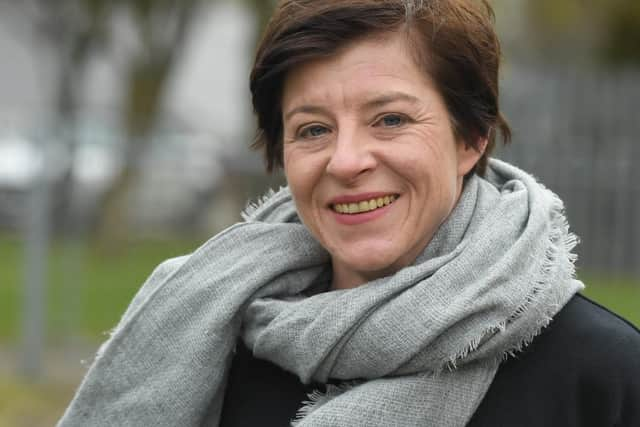The Preston primary school striving to give pupils a sense of normality during lockdown - wherever they are
and live on Freeview channel 276
But for primary schoolchildren, that extended absence – and their unavoidable exposure to the frightening reasons for it – will surely leave a lasting impression.
With no immediate prospect of a return to the classroom – less still a return to a recognisable routine when they do eventually get back behind their desks – the headteacher of one Preston primary school is warning that the potential longer-term effects of the coronavirus crisis should not be overlooked.
Advertisement
Hide AdAdvertisement
Hide Ad“The mental wellbeing of these children is going to be at least as important as their education,” says Annalisa Howarth, who leads English Martyrs' Catholic Primary on the outskirts of the city centre.


“Coincidentally, our staff had already started doing training in helping children deal with trauma [before the outbreak], which is now quite appropriate.”
In a message on the school website, parents are reassured that, whatever their child’s capacity for home learning, “keeping them safe, loved, secure and calm is the most important thing to do at home”.
Mrs. Howarth says that the proportion of the home-schooled day taken up by the largely revision-based work set by teachers will vary from one age group to the next.
Advertisement
Hide AdAdvertisement
Hide AdHowever, one unifying endeavour in which all the children can get involved is the increasingly inventive “daily challenge”, designed by Mrs. Howarth herself. A recent example? Making a picture out of cooking utensils.
Meanwhile, as a way of trying to bring a degree of normality to abnormal times, English Martyrs' – like so many other schools – is attempting to ensure that its pupils do not feel cut off even while they are forced to keep away from the classroom.
Since the school gates were closed, keeping in contact with families has become a priority – with a recognition that each will need a different level of support during the lockdown. And that has meant drawing not on information from a database, but detailed knowledge of all 226 pupils on the register.
“The importance of knowing your children is really coming to the fore in this situation – and I’ve got to know the families even better through this. They have all been fantastic and really appreciative.
Advertisement
Hide AdAdvertisement
Hide Ad“We are making calls to families throughout the week, some several times a week – and if the staff doing that haven’t been able to [get in touch] with someone for a couple of days, then I’ll jump in the car and nip round.
“The teaching staff have been phenomenal updating their online class pages every day and we have set up emails for every class, so the children can contact their class teacher directly,” explains Mrs. Howarth, who last month made a personal call to any family she had not spoken to since the lockdown began.
The self-confessed list-maker says that she has found the kind of support she aims to offer her pupils in the form of new geographical hubs promoting co-operation between schools in the same area. Mrs. Howarth says that the long-planned arrangements – brought forward earlier than intended by Lancashire County Council – mean that she can now have her own daily chats with a dedicated adviser whose role is to help with the many challenges which schools are facing.
Among them, of course, is the fact that schools remain open for the children of key workers and some other groups.
Advertisement
Hide AdAdvertisement
Hide AdFewer than a dozen are coming through doors at English Martyrs on the average day – although there is nothing average about the school day during a global pandemic.
“The only things we do rigidly every day are the 30-day Lego challenge – because we’re determined to complete it – and some kind of PE. And at 11am, we get a hot chocolate and listen to the story of the day with David Walliams,” Mrs. Howarth says.
“The children are just getting on with it – they’re all in different year groups, they’re not friends in normal school life, but there hasn’t been any falling out. Plus, they are all fantastic at coming in and trooping off to wash their hands.
“We’re just making the most of it – we’re having a barbecue once a week and we design a menu with the children for the other days, which one of my very talented teaching assistants prepares. Then we all sit down for lunch together.”
Advertisement
Hide AdAdvertisement
Hide AdAs with so many other aspects of life under lockdown, schooling – whether at home or in the classroom – has seen the random become routine. And for Mrs. Howarth, that might just be the key to getting children through the current crisis.
“A lot of it is about reassurance – I’m there with my list every day, whether in person or on the phone. It’s these little bits of normality that we all need to take our mind of things.”
Normality – a concept which this generation of schoolchildren will hear about more often than most. They will know that the adults in their lives are striving for it – and maybe they themselves are longing for it.
But the length of time it takes to return will determine how much they can remember about what normality actually feels like.
Comment Guidelines
National World encourages reader discussion on our stories. User feedback, insights and back-and-forth exchanges add a rich layer of context to reporting. Please review our Community Guidelines before commenting.